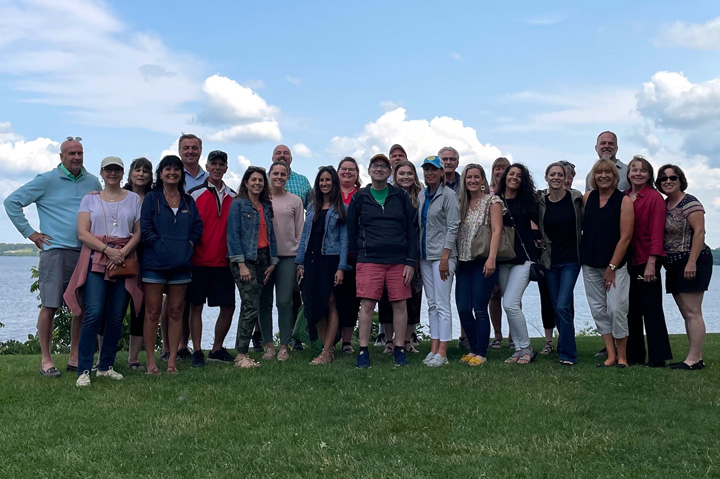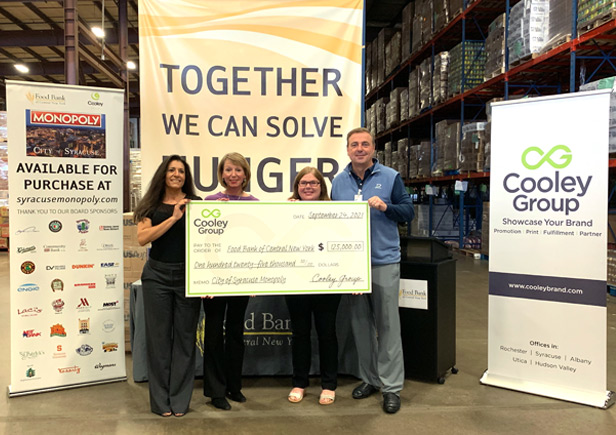October 18, 2021
Cooley Group Celebrates 75 Years
The upstate New York firm was first established as a business forms supplier. Today, it’s a newly rebranded full-service distributorship that serves clients across the country.
Phil Yawman, president of Cooley Group (asi/168125), discusses the COVID experience, the company’s recent rebrand and ongoing Q4 challenges.
Q: How did the company get its start?
A: It was founded in 1945 in Rochester, NY, as The Cooley Company, a business forms supplier, by Clarence “Scoop” Cooley. They opened a Syracuse office in 1965 and a Utica office in 1972, and we now also have offices in Albany and the Hudson Valley. The offerings have expanded too, including promotional products, apparel, signs and specialty printing. Business forms still make up a small portion of our sales. We now have 27 people, including our brand consultants and customer-facing support staff, and we serve clients nationwide. I joined in December 2018, after many years in the telecom industry. In recent years, the company has been recognized as a best place to work and for its imprinting capabilities.

The Cooley Group team recently went on a well-deserved trip to the Finger Lakes in upstate New York.
Q: What were the early days of the pandemic like for your team?
A: New York was hit particularly hard by COVID. We were deemed an essential business early on because of our healthcare clients, and we very quickly moved into PPE and started addressing our clients’ needs, like sanitizer and masks. That helped us acquire new accounts, and we’re now developing deeper relationships with them. It’s been a painful time for the industry, but we weathered the storm well. Things have been relatively stable for us; our revenues were only down by single digits. This is an employee-owned company, so we have a culture of ownership. But as a leader in a crisis, you have to communicate more and be more visible than normal.
The experience did help pull us together. I think crisis reveals character rather than building it. We have a spirit of togetherness, camaraderie and lasting trust that helped us survived all this. It’s been a constructive byproduct of the situation. Early on, we furloughed 25% of our workforce for six weeks. It was painful and it stretched those who remained, but we brought everyone back in six weeks. It’s important to be an open and transparent leader. I’d rather give an answer that the person doesn’t want to hear and that’s rooted in reality, rather than something that’s sugarcoated.
Q: When did you decide on a rebrand?
A: It was about a year after I started here. I first wanted to address operations because the processes and systems were a bit antiquated. We wanted to make sure we could handle more volume and demand with expanded product and service offerings, like online stores and kitting. COVID sidetracked things for a little while, but we needed to evolve and demonstrate the focus we have on what we can do for clients.
Q: What are the different elements of the rebrand?
A: We changed “Company” to “Group” because we wanted to evoke the collaboration we have with our team and customers. And the new tagline, “Showcase Your Brand,” is exactly what we do: We help clients showcase their brand to their target audiences. In the logo, we kept the green because it signifies growth, spring, progression and forward-thinking, and the infinity symbol shows that we want relationships to last forever, and we offer endless possibilities. The entire rebrand took about three to six months. We help our clients with their rebrands all the time, so once we decided to do it, we knew we needed to execute well and walk the walk because it was reflective of our company.
Q: What have the past few months looked like for your firm?
A: We’ve started doing larger projects than we’ve ever done before, including online company stores. We recently worked with a few companies that have about 15,000 employees each; we put together appreciation stores with themed bundles for employees to choose from. So instead of, “Sure, we can get you a yoga mat, a water bottle, a mug,” they could choose the workout kit or the relaxation kit.
We deliver product, but we also ask important questions, such as: What are your goals? What are your objectives with these items? And we create solution options for them. Companies go to market in very different ways; small businesses are different from Fortune 100 firms, which have procurement departments and RFPs. We had to align internally on how to address how various companies go to market.
Q: Can you tell us about a favorite project that your team worked on recently?
A: We purchased the rights to develop a customized MONOPOLY game for the City of Syracuse with a significant portion of the proceeds going to Food Bank of Central New York. We worked closely with Hasbro to adhere to their brand requirements, and our brand consultants worked with local companies and organizations to arrange sponsorships for the game tokens and board properties. They also coordinated artwork and descriptions for the board, property cards, tokens, Community Chest and Chance cards. Everything was customized for the locale, including landmarks and localisms, so it became a symbol of community pride. We also had an online store and provided fulfillment services. At the end, we were able to donate $125,000 to the Food Bank, which serves 11 counties in upstate New York and will allow the organization to donate more than 17 million meals. It was one of the largest donations the organization has ever received.

Cooley Group presents Food Bank of Central New York with a check from the proceeds of the City of Syracuse MONOPOLY game, which the distributor managed.
Q: What are your plans for what’s already a challenging Q4?
A: Our objectives haven’t changed because of supply chain challenges. We’ve been in front of all this as much as possible. We had clients ordering for Q4 as early as August, and we’ve had a lot of holiday business over the last 45 days. Our preferred partner program has helped (over half of our orders are placed with these suppliers), as well as the Premier Group Network. But many suppliers are completely out of stock or they can’t commit to inventory. This will all last into 2022, well into the spring. It won’t be fixed in a week; we’re waiting for steady improvement.
Q: How can the industry effectively address these challenges?
A: We have to be open, honest and forthcoming, and we can’t overpromise just to get the sale. We’re relationship-sellers, and that needs to transcend a single order. I’m OK with losing business to a distributor making promises we’re not comfortable making. I don’t want to sacrifice a long-term relationship for a short-term deal.
